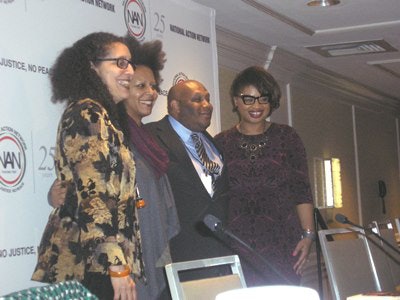 From left to right, Professor Lani Guinier, Dr. Christina Greer, Dr. Jamal Eric Watson and Dr. Khalilah Brown-Dean at Thursday’s session. (Photo by Lois Elfman)
From left to right, Professor Lani Guinier, Dr. Christina Greer, Dr. Jamal Eric Watson and Dr. Khalilah Brown-Dean at Thursday’s session. (Photo by Lois Elfman)A distinguished panel of scholars shared their thoughts on what the role of Black intellectuals should be in the current political and social climate as well as looking toward the future.
Among the presentations at the National Action Network’s National Convention & 25th Anniversary Celebration being held this week in New York City was a frank and open discussion about how Black intellectuals and scholars should view their work and its impact beyond academia. The three panelists discussed a bit about their own work and how their perspectives have evolved.
A recurring theme was how the world beyond the academy has to affect how a Black intellectual views his or her teaching and research within a broader societal context. Also, how their standing in the community can bring about change.
“Throughout history, Black scholars have often been audacious in providing a sharp critique of the social, political and economic landscape plaguing our people,” said moderator Jamal Eric Watson, senior staff writer at Diverse. “Black intellectuals have provided the probing analysis and deep interpretation needed in order to understand Black life.”
Lani Guinier, Bennett Boskey Professor of Law at Harvard University, said it is a matter of understanding the context. When only in fourth grade in Queens, New York, she encountered a White teacher, Mrs. Buxton, who seemed to resent her very presence in the class, as Guinier had skipped third grade. This did not dissuade Guinier from being inquisitive, asking probing questions and demanding responses. When a group of Black students joined the class, she also learned her role was getting others to learn and explore new ideas.
“I would challenge Mrs. Buxton and give her details that I thought she was overlooking, such as asking about George Washington’s slaves,” Guinier said. “That was the beginning of my realizing that if I wanted to be a good citizen, I needed to respond to Mrs. Buxton and, in the process, enable some of the students in the class to learn things that they hadn’t been thinking about.
“What I learned in fourth grade I think is very relevant to what the question is on the table here,” she added. “We need to talk to each other, but we also need to read what other people are writing. We need to be able to interpret it, but also to critique it if we don’t agree with it. Be engaged with the ideas so that we feel confident that when we’re making a speech or when we engaged in a conversation that there’s merit to what we are saying.”
Dr. Christina Greer, an associate professor of political science at Fordham University, said she sees the Black intellectual as a bridge between several worlds “those who have access and those who don’t have access and all the gradations in between. Academic interests can also spawn community interests and activism.
“Degrees … really don’t matter if we’re not speaking to the entire group,” Greer said. “Sometimes people get so caught up in the academy, they don’t know how to communicate to the public.
“What is the point of having all this knowledge if we actually can’t talk to them?” she added. “I see us as specialists, observers and analysts of not just the seen, but also the unseen, since we have had particular access that other people haven’t had. It’s our responsibility to go back into the community.”
Greer said Black intellectuals are responsible for doing four critical things: thinking, listening, writing and reading. They cannot lapse on any of these, and they must make sure they’re not putting themselves into a silo, isolated from the community.
For Dr. Khalilah Brown-Dean, associate professor of political science at Quinnipiac University, it’s important to listen to the voices of people who were direct witnesses to history. Also, it is necessary to back up social justice issues with data.
“What we are dealing with as scholars, as people, is bigger than party, is bigger than election, is certainly bigger than any candidate,” said Brown-Dean. “That to me is the role of an intellectual.
“What I try to involve myself in is what I call public scholarship,” she continued. “That is making what I do accessible to multiple audiences and figuring out how the work that I do can empower communities.”
She also discussed exerting influence when necessary. Brown-Dean completed her undergraduate studies at the University of Virginia. When she saw a video of current UVA student Martese Johnson, who’d been bloodied by liquor control agents, she went to Virginia to meet with him.
“We knew our alma mater cared not because we’re graduates, but because we write big checks,” she said. “We went, we marched — 800 African-American alumni from around the country. [I was] using the training I had as an academic to know what it is they care about.
“… When we think about the future of Black intellectuals, that’s the critical thing — institutions matter,” she continued. “We have to think about how institutions change. There has to be a radical transformation.”



















